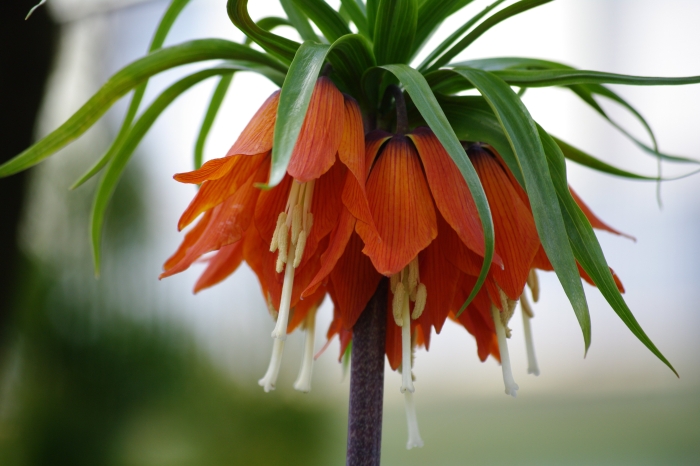Imperial Fritillary
(Fritillaria imperialis)
Imperial Fritillary (Fritillaria imperialis)
/
/

mhaller1979
CC BY 2.0
Image By:
mhaller1979
Recorded By:
Copyright:
CC BY 2.0
Copyright Notice:
Photo by: mhaller1979 | License Type: CC BY 2.0 | License URL: https://creativecommons.org/licenses/by/2.0 | Uploader: Alexis Jazz | Publisher: Wikimedia Commons | Title: Red_Flower_777.jpg | Notes: {{en|''Fritillaria uva-vulpis'', source: own work, date: 2006.05.02, author:~~~, permission: GFDL, CC-BY-2.5}} {{pl|''Fritillaria uva-vulpis'', źródło: praca własna, data: 2006.05.02, autor:~~~, licencja: GFDL, CC-BY-2.5}} |
































Estimated Native Range
Summary
Fritillaria imperialis, commonly known as Imperial Fritillary, is a deciduous perennial bulb native to a range of habitats including rocky slopes, scrub, and subalpine meadows, as well as the edges of fields and cultivated land in the Middle East, Afghanistan, Pakistan, and the Western Himalayas. It can reach up to 1 meter (3 feet) in height and is characterized by its lance-shaped, glossy leaves that are arranged at intervals along the stem. The plant is crowned with a prominent whorl of bell-shaped flowers that face downward, in shades of orange-red to yellow, and topped by a ’crown’ of small leaves, which gives rise to its regal name. The flowers are particularly showy and make a bold statement in the late spring garden, typically blooming in late April to May. The blooms emit a musky odor that is effective at deterring rodents and other small animals.
Imperial Fritillary is valued for its striking appearance and is often used in border plantings, cottage gardens, and as a focal point in spring displays. It requires well-drained soil, preferably sandy or loamy, and thrives in full sun to part shade. While it is relatively easy to maintain, it is susceptible to bulb rot if overwatered or planted in poorly drained soils. It is also prone to lily beetle infestations. Despite these issues, its unique flower structure and height make it a desirable addition to many gardens.CC BY-SA 4.0
Imperial Fritillary is valued for its striking appearance and is often used in border plantings, cottage gardens, and as a focal point in spring displays. It requires well-drained soil, preferably sandy or loamy, and thrives in full sun to part shade. While it is relatively easy to maintain, it is susceptible to bulb rot if overwatered or planted in poorly drained soils. It is also prone to lily beetle infestations. Despite these issues, its unique flower structure and height make it a desirable addition to many gardens.CC BY-SA 4.0
Plant Description
- Plant Type: Bulb
- Height: 3-4 feet
- Width: 1-1.5 feet
- Growth Rate: Slow
- Flower Color: Yellow, Orange, Red
- Flowering Season: Spring
- Leaf Retention: Deciduous
Growth Requirements
- Sun: Full Sun, Part Shade
- Water: Medium
- Drainage: Medium, Fast
Common Uses
Bee Garden, Deer Resistant, Drought Tolerant, Rabbit Resistant, Rock Garden, Showy Flowers
Natural Habitat
Rocky slopes, scrub, subalpine meadows, and edges of fields and cultivated land
Other Names
Common Names: Crown Imperial, Kejserkrone, Kaiser’s Crown, Kaiserkrone, Couronne Impériale, Kejsarkrona, Coroa-Imperial, Diadema
Scientific Names: , Fritillaria imperialis, Petilium imperiale, Fritillaria imperialis var. longipetala, Fritillaria imperialis var. rubra-maxima, Imperialis comosa,
GBIF Accepted Name: Fritillaria imperialis L.